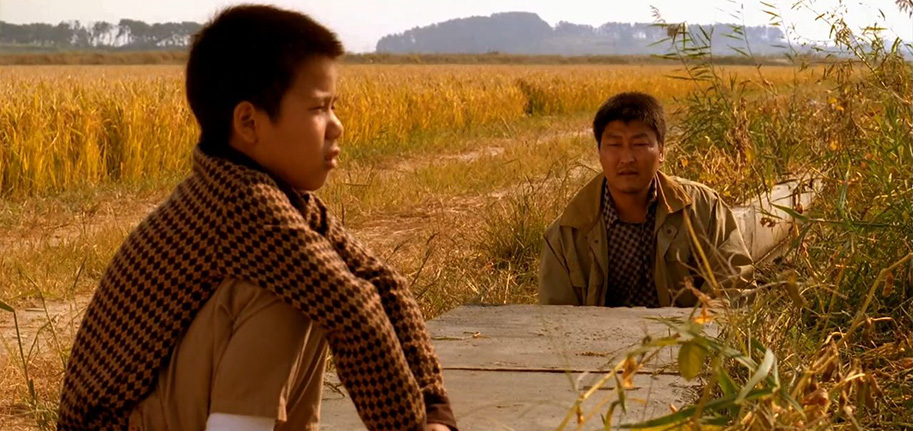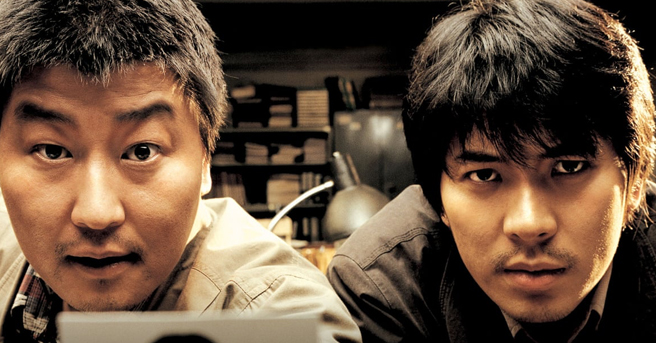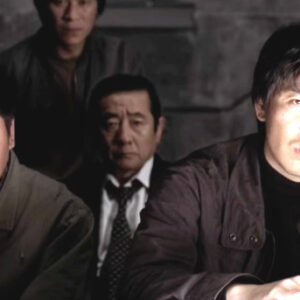Last Updated on July 30, 2021
Story: Two cops must work together to hunt down and catch a serial rapist and murderer during the late 80s in South Korea.
Review: For many, Bong Joon Ho’s astonishingly perfect, Oscar-winning PARASITE was their introduction to the director’s work. If those same viewers decided to go back and start checking off the filmmaker’s past entries (SNOWPIERCER, MOTHER, THE HOST), they’ll soon realize he’s been crushing it for years, releasing one masterful film after another. But it’s with his second feature-length effort – 2003’s MEMORIES OF MURDER (which is getting a re-release in theaters this week and on via Video on Demand later this month) – that Bong delivered a film that ranks just as highly as his recent awards-sweeping sensation, and with a new release will prove to a new audience that it’s not only one of the great crime dramas of all time, but one of the great movies of the century.
In fact, moreso than his other films can a parallel be drawn between MEMORIES and PARASITE – most notably in how Bong so masterfully walks a tonal tightrope between an infectious sense of dark comedy and richly compelling dramatic tension. Given the subject matter of MEMORIES – loosely based on Korea’s first serial rape/murders, taking place between 1986 and 1991 – this trick was much harder to pull off, which makes it all that much more impressive. At the start, we’re introduced to a modern-day Park Doo Man (Song Kang Ho, Bong’s apparent muse who has gone on to star in several of his films), who we see revisiting an old crime scene, only for us to be transported back to 1986, wherein he, as a detective, discovers the body of a woman who was assaulted and killed. Rain-slicked and with a bleak visual style that all recalls David Fincher’s SEVEN, that last thing you would expect is a casual, almost absurdist approach to the investigation. But that’s how Bong depicts Park and his team’s approach – and it’s brilliant.

Song expertly executes Park’s over-confident, crass style as a cop who puts far too much faith in his instinct and "gift" for looking into a man’s eyes and know for a fact if he’s guilty or not. Perhaps like far too many cops who have investigated serial murderers in the past, he and those around him spend far too much time going after usual suspects – mainly people they would deem as “weird” or “creepy – and either beat, guilt or even frame into confessing. As Park and his partner, Cho Yong Koo (Kim Roi Ha) beat and berate suspects, a dark sense of humor and bluntness coming from Bong’s precise framing and blocking undercuts to the depiction of their cruelty and ineffectiveness. As much as this is a crime drama, at the start, it’s understandable to see it as a black comedy examining police brutality, as they frame the narrative to fit their purposes, calm the public, and bask in the media attention.
But to juxtapose it all and get things back on track is Seoul detective Seo Tae Yoon (Kim Sang Kyung), the hard-boiled, noir detective to Park’s more physical, flippant personality. He sits coolly off to the side taking in their approach to crime-solving with a cigarette in his mouth and an aura of mystery around his shaggy hair. As they’re soaking up the media attention, he’s proving their findings false with simple police work, like examining the hands of a mentally-challenged suspect and ruling their deformity alone as proof he’s innocent. At the heart of the movie is the clash between these two styles, and as the true killer evades their capture their inability to focus means more women will be killed, and the toll will grow larger and larger.
With as flawless a script (from Bong and Shim Sung Bo) and cinematography (Kim Hyung Koo) as the direction, all manners of the case are effortlessly juggled as the shift in tone and character dynamics seamlessly grows darker and darker. There is so much to pay attention to purely when it comes to the case and how the police go about trying to solve it, but Bong never misses a chance to make sure we never forget the true tragedy throughout. Several times across the movie – through recollection from a survivor to murders in the act – we see several women become victims of the killer and come face-to-face with their pain. Very real women lost their lives at the hands of a madman, and through his film, Bong captures the brutality and horror, which makes the need to see someone brought to justice become increasingly dire, which makes the investigation all the more palpable and the failure equally disheartening.

In this evolution from a darkly comic exploration of folly police procedure into an incredibly tense crime thriller wherein it’s impossible not to feel some sort of empathy for the detectives, Bong crafted a beautifully layered, haunting story with a supreme level of cinematic scope. It works just as much as a character study as it does a crime saga. By the end – in what is among the most perfectly executed final 20 minutes you’re likely to ever see – the police are at their emotional ends. They’re so demoralized they can’t even muster words to speak to the press when yet another victim is found, and both Park and Seo and become opposites of themselves. The former has become calmer and more dedicated, showing that there is still some sense of a skilled cop in him, while the latter begins to betray is his level-head for an unchecked sense of rage. While not just about one thing, this is a story, most resonantly, about failure, and what a constant string, and ultimately final stamp of, does to a human being. Whatever self-imposed code and sense of self these men had is beaten down and demolished and left with nothing but doubt – perfectly nailed in a line by Park, wherein looking into the suspected killer’s eyes, trying to use his “gift” to decern guilt or innocence, can only muster, sullenly, “Fuck, I don’t know.” In the final moments, Park looks to the camera with a sense of realization and clarity, finally, after nearly 30 years, realizing how what he should've been looking for all along.
What starts off as something undeniably entertaining albeit dark cop story turns into a gripping thriller and ultimately ends as an unforgettable tragedy, and through it, Bong masterfully walks the tightrope of tone and character development to bring it all home. It’s a skill he would go on to demonstrate, again and again, all the way to a deserved directing/writing/Best Picture win earlier this year. But it’s not something he necessarily had to work on. His genius was always there with MEMORIES OF A MURDER, Hitchcockian attention to detail and masterclass of exactness on full display. Over the last 17 years, much has been written about the movie and it doesn’t need my help in securing itself as one of the great, underseen movies of our generation. But now the opportunity is more available than ever, and any moment you spend not watching every perfect second for the first time – or even with a rewarding re-watch – is one of abject failure on your part.


















Follow the JOBLO MOVIE NETWORK
Follow us on YOUTUBE
Follow ARROW IN THE HEAD
Follow AITH on YOUTUBE